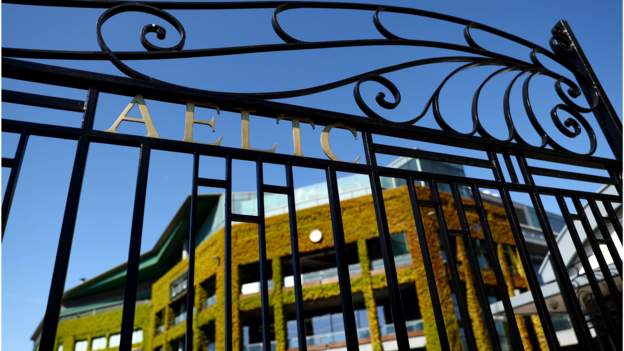
Wimbledon has banned Russian and Belarusian players because it is not prepared "to be used to benefit the propaganda machine of the Russian regime", says chairman Ian Hewitt.
The tournament is unlikely to waver on the move, despite criticism from tennis governing bodies and many players.
Wimbledon runs from 27 June to 10 July.
"If conditions significantly change, we would happily review. At this point, we're very clear about our intent," chief executive Sally Bolton added.
Meanwhile, the organisers of the grass-court Grand Slam also announced that players who are not vaccinated against Covid-19 will be able to compete at the All England Club.
Serbia's Novak Djokovic, the men's world number one and defending Wimbledon champion, was not allowed to play at the Australian Open in January following a row which centred around him being unvaccinated.
"The requirement set out by the government to enter the UK does not include mandatory vaccination," Bolton said at Wimbledon's annual spring conference.
"Therefore, while it is of course encouraged, it is not a condition of entry."
Decision to ban players is the 'most responsible'
The decision to ban Russian and Belarusian players from this year's tournament was "intensely tough and agonising" but was the only viable option under guidance from the British government, Hewitt said.
The tournament announced the move last week in response to Russia's invasion of Ukraine.
The players are also banned from any of the UK grass-court tournaments.
"It is an extreme and exceptional situation which takes us far beyond the interest of the tennis world alone," said Hewitt.
"Russia's ongoing invasion has led to catastrophic harm to millions of lives in Ukraine and has been condemned worldwide.
"The UK Government has set out directive guidance for sporting bodies and events with the specific aim of limiting Russia's influence. We have taken that guidance into account as we must as a high-profile event and leading British institution.
"Bound to act, we believe we have made the most responsible decision in the circumstances."
What has the reaction to the move been?
The ATP and WTA - the governing bodies of men's and women's professional tennis - said the move was "unfair".
Some players including Ukraine's Elina Svitolina welcomed action, but the former Wimbledon semi-finalist said Russian and Belarusian players who speak out against Russia's invasion should be allowed to compete.
Russian world number eight Andrey Rublev said the Wimbledon ban is "complete discrimination" and "illogical".
Djokovic said he did not support the "crazy" decision, while Martina Navratilova, who won a record nine Wimbledon singles titles, said excluding Russian and Belarusian players was "not the way to go".
Hewitt said Wimbledon had considered "at length" allowing players to compete if they provided specific written declarations.
"Even if we were able to accept players with written declarations we would risk their success or participation at Wimbledon being used to benefit the propaganda machine of the Russian regime - which we could not accept," he added.
"We also have a duty to ensure that no actions we take place the players or families at risk.
"We understand and deeply regret the impact this decision will have on every individual affected and so many people are suffering as a result of this terrible war."
Men's world number two Daniil Medvedev of Russia and women's world number four Aryna Sabalenka of Belarus are the highest-ranked players to be affected.
Russian world number 15 Anastasia Pavlyuchenkova - who called for the war to stop earlier this year - and 18th-ranked Victoria Azarenka of Belarus will also miss out.
What else was announced about this year's Championships?
Wimbledon's annual spring conference is an opportunity for the All England Club to outline and discuss the key issues before the upcoming Championships.
The other headlines announced by Bolton in Tuesday's news conference include:















 Phone: (800) 737. 6040
Phone: (800) 737. 6040 Fax: (800) 825 5558
Fax: (800) 825 5558 Website:
Website:  Email:
Email: 






